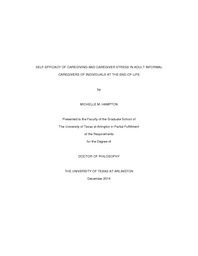| dc.description.abstract | Researchers have established an association between the stressors of providing informal care and physiological and psychological health risks (Applebaum & Breitbart, 2013; Au et al., 2010; Bainbridge, Krueger, Lohfeld, & Brazil, 2009; Gilliam & Steffen, 2006; Mausbach et al., 2012; Merluzzi, Philip, Vachon, & Heitzmann, 2011; Perez, Ussher, Butow, & Wain, 2011). Despite the recognized negative consequences of informal care, researchers have identified the existence of mediators which have the potential to buffer, manage, transform, or prevent the negative influence of stress (Bolden & Newsome-Wicks, 2008; Kreitler, Peleg, & Ehrenfeld, 2007; Merluzzi et al., 2011; Roscoe, Corsentino, Watkins, McCall, & Sanchez-Ramos, 2009). The purpose of the study was to determine the relationship between self-efficacy and stress in adult informal caregivers providing end of life care while controlling for caregivers' socioeconomic status. A cross-sectional, associational design which included 78 adult informal caregivers who were providing end-of-life care for an adult was conducted. Caregivers answered a demographic questionnaire and three survey instruments measuring caregiver self-efficacy, perceived stress, and perceived health. The Stress Process Model (Pearlin, Mullan, Semple, & Skaff, 1990) was used to guide this study. The study was approved by the University of Texas at Arlington Institutional Review Board.Study participants included a convenience sample of 78 cognitively intact, English speaking, adult informal caregivers who were providing end-of-life care for an adult in the North Central Texas Region. Caregivers were caring for individuals with a variety of illnesses, the most frequent of which was reported as cancer. A majority of the care recipients resided with the caregivers, and all of the sampled caregivers were receiving some level of caregiving support from an agency that provided end-of life supportive services.Caregiver self-efficacy had a significant, negative correlation with perceived stress (r = -.53; p < .01). Caregiver self-efficacy explained 28.3% of the variance in perceived stress. Because self-efficacy is a multi-dimensional construct, a multivariate regression was performed to explore the relationship between caregivers' confidence in managing medical information, caring for the care recipient, caring for oneself, and managing difficult interactions and emotions and perceived stress. Caregivers' confidence in caring for themselves had a significant negative relationship with perceived stress (r = - .63, p < .01). Caring for oneself predicted 38% of the variance in perceived stress.Caregivers with higher levels of confidence in managing demands of caregiving had lower levels of perceived stress. More specifically, caregivers' with higher levels of confidence in caring for themselves had lower levels of perceived stress. These findings highlight the importance of caregivers' self-care needs. Healthcare practitioners must recognize and intervene to support caregivers' self-care needs. Further research is needed to investigate caregivers' self-care needs as well as to investigate interventions which might enhance caregivers' self-care. | en_US |


